This is the second part of Stewart Dunlop’s two-article series examining the key findings from the United States v. Google ads trial, which concluded in Virginia last month and sought to test whether Google was breaking antitrust laws. You don’t have to have read Part I but it won’t hurt.
The Google ads trial revealed a number of significant ways in which the company secretively manipulated the ads auction in ways the US Government felt was anticompetitive.
This has also broken the trust many advertisers had in Google. That is something we’re going to explore in more depth.
The Response of Big Business
Here’s what Vincent Norris, Ecommerce media manager at Sony Europe had to say about the revelations that Google was manipulating prices. His view can be thought to speak for many, encapsulating the feeling that Google has a huge transparency problem:
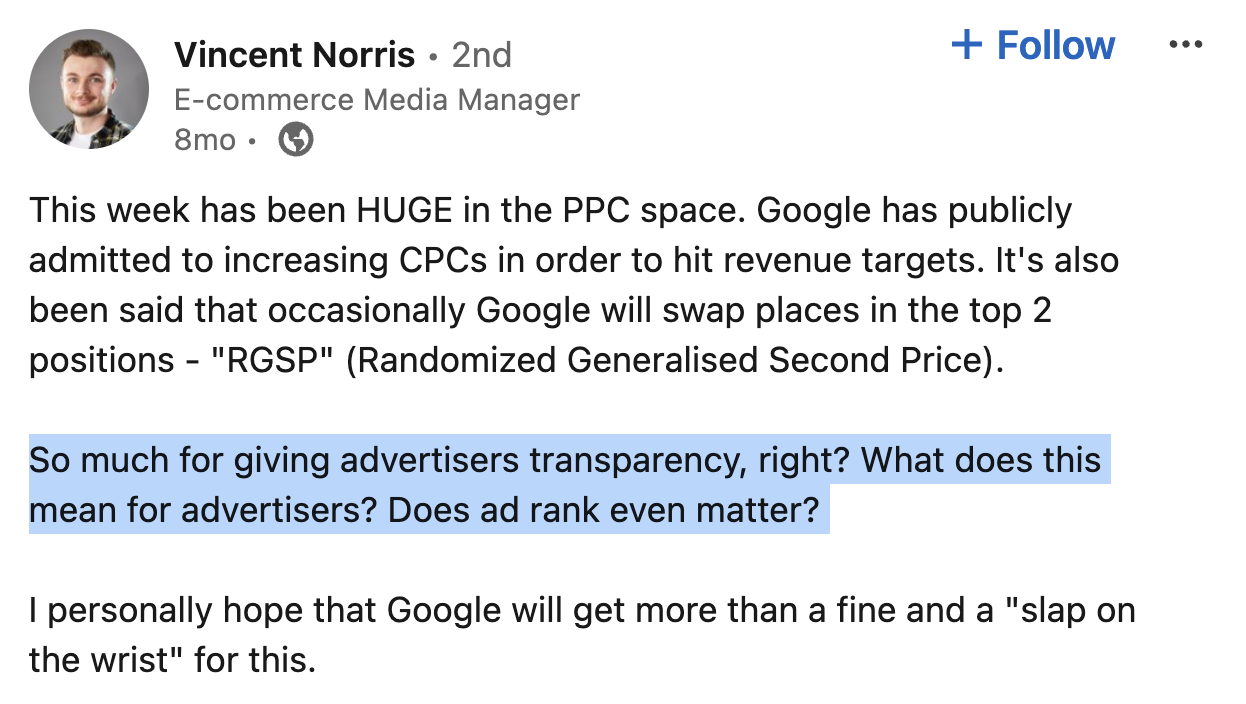
One of the most frustrating single quotes to come from this entire case was this from Jerry Dischler of Google:
“We tend not to tell advertisers about pricing changes”
Andy Taylor of Tinuiti points out the hypocrisy, given Dischler’s statement back in 2015:

Reduced Ad Effectiveness
Testimonies from industry executives show how the effectiveness of Google ads has decreased over time.
Jeff Hurst, the former COO at Expedia, testified during the trial that Expedia’s costs for advertising Vrbo on Google increased from $21 million in 2015 to $290 million in 2019.
That’s more than a 10X increase in spend over 4 years.
Despite that, the number of people attracted to the site did not shift.
Expedia’s own CEO Peter Kern said back in 2020 when this case was first announced, “I’m very pleased to see the government finally taking some action. Hopefully, it will create a fair marketplace for us, which is all we want. We have no ax to grind against Google, except that we don’t think the marketplace is equitable.”
In fact, another major travel company Booking.com launched an internal project called “project tulip” aimed at showing how aggressively Google’s changes had been impacting their business.
Details of this project were revealed during the trial.
Booking.com mentioned that a single design change in May 2019 had an ‘overnight effect’ on their business, since Google ads all of a sudden became much harder to distinguish against organic results.
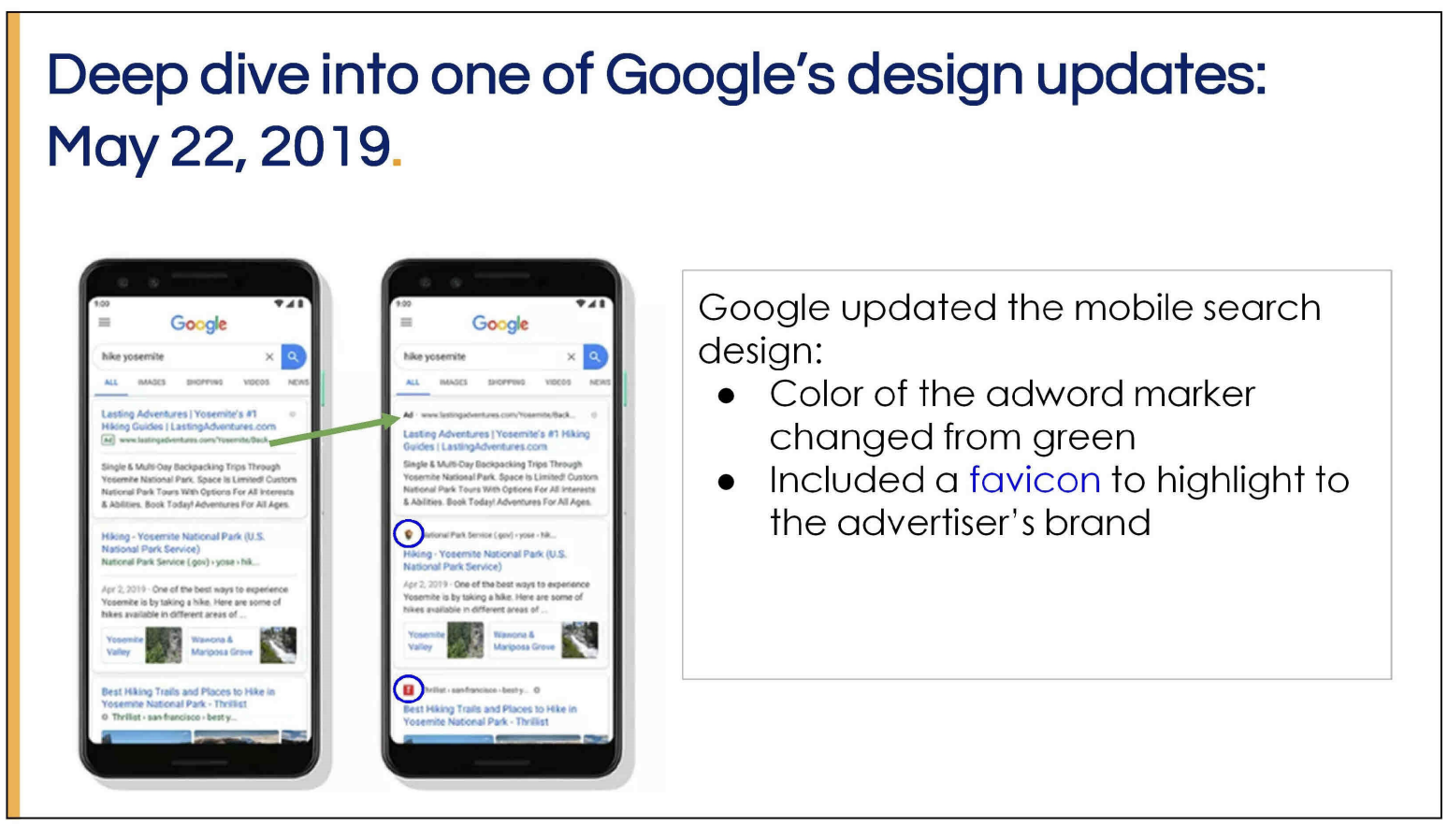
Arjan Dijk, a senior exec at Booking.com who had previously worked at Google said that they were a “benevolent dictatorship” and that advertisers “just have to accept any changes that Google makes.”
Companies’ Dependence on Google Ads
One thing this trial has highlighted is the unique value of Google search ads. They work, and businesses can’t afford not to use them.
Despite advertisers taking the stand under oath to testify against Google, they all say pretty much the same thing: We have to use Google search ads.
Tracy-Ann Lim of JPMorgan stated that search ads are mandatory for any advertising campaign, highlighting the lack of viable alternatives.

It shows that despite frustration amongst advertisers, right now there really is no good alternative to Google ads.
This strengthens the DOJ’s argument that Google is in fact a monopoly, and abuses its power as such.
The Push to Broad Match
It’s no secret that Google has been pushing advertisers towards using broad match ad campaigns instead of exact match.
Jump into any Google ads account, and you’ll inevitably see a recommendation from Google to set up a broad match campaign. Google clearly wants to allow automation and machine learning to take over from specific keyword selection.
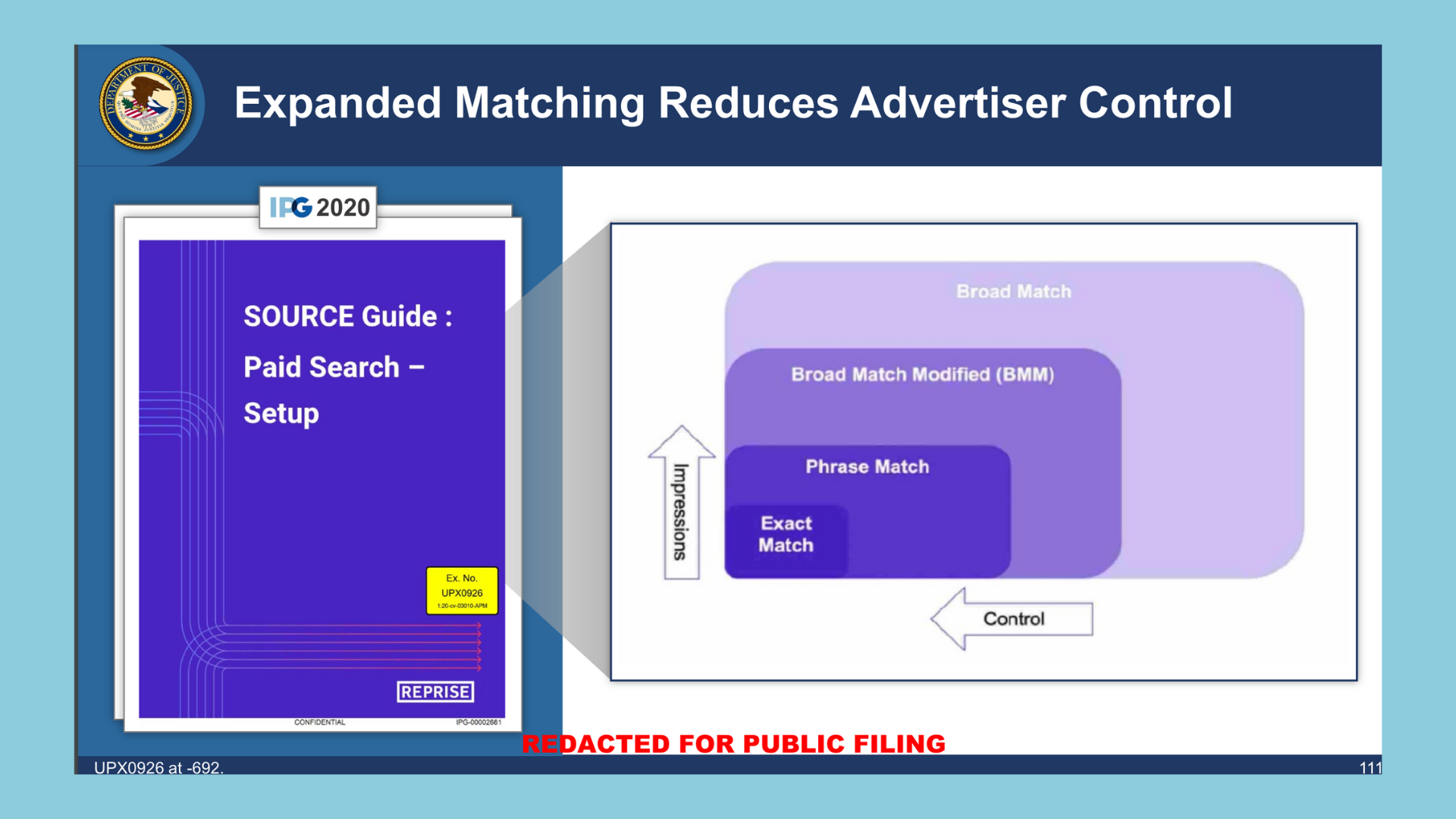
Google argues the push toward broad match & performance max campaigns help advertisers reach a broader audience. The trial revealed it also serves to increase Google’s revenue by inflating the size of ad auctions.
Of course, we do have to recognize that in many cases, Google’s more automated campaign types may in fact have improved performance over other campaign types.
What was revealing was that in a leaked email, Prabhakar Raghavan (now head of Google ads) recognised potential issues with expanding matches:
“If done poorly, expanded match could come at a cost to either the user or the advertiser or both, and auction pricing was a reference to auction mechanisms or launches that do things that are not right for the long term,” Raghavan said.

In addition, many advertisers struggle to opt out of these auctions now, especially with new AI-led campaign types like Performance Max which essentially take away human control and place it in the hands of Google’s machine learning.
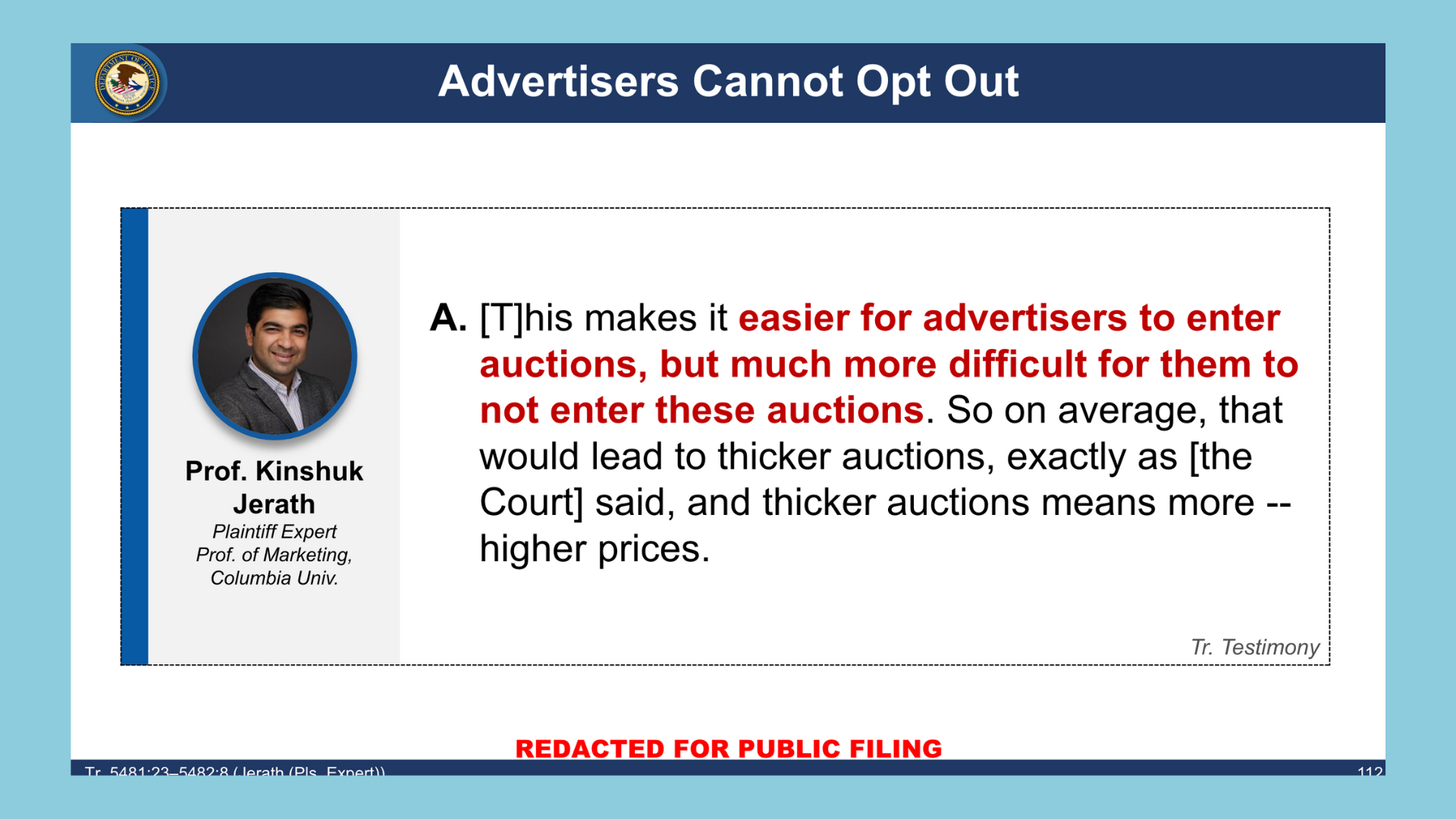
Essentially, Google wants to keep expanding match types while moving more toward an environment where advertisers can’t opt out of these expansions.
This creates thicker auctions in general with more participants, and inflated CPCs.
Here’s some testimony from the case which confirms this:
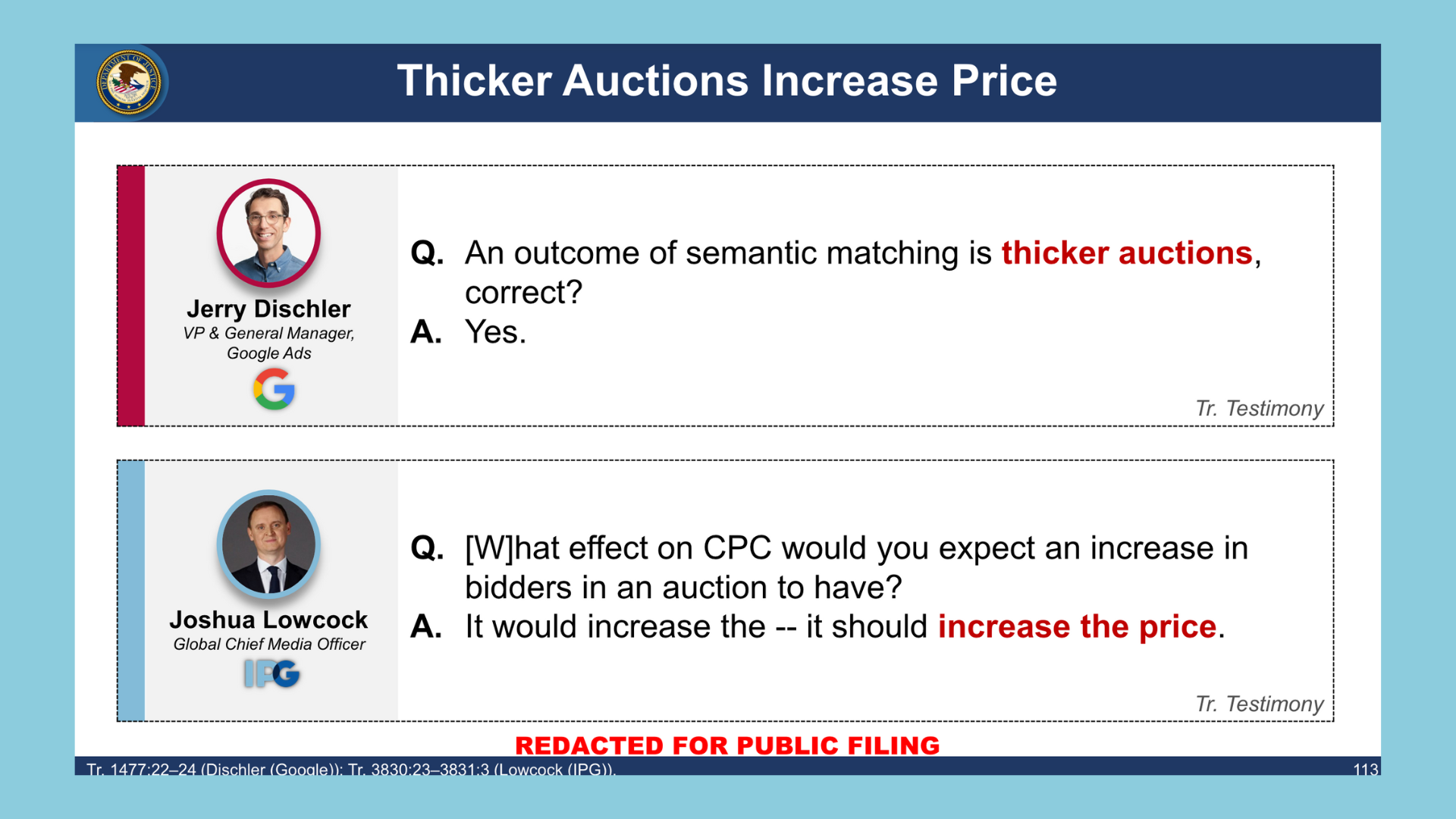
Google acknowledged its keyword expansions increased CPCs, with one document noting that advertisers “may see an increase in cost because they are targeting more searches than they were previously.”
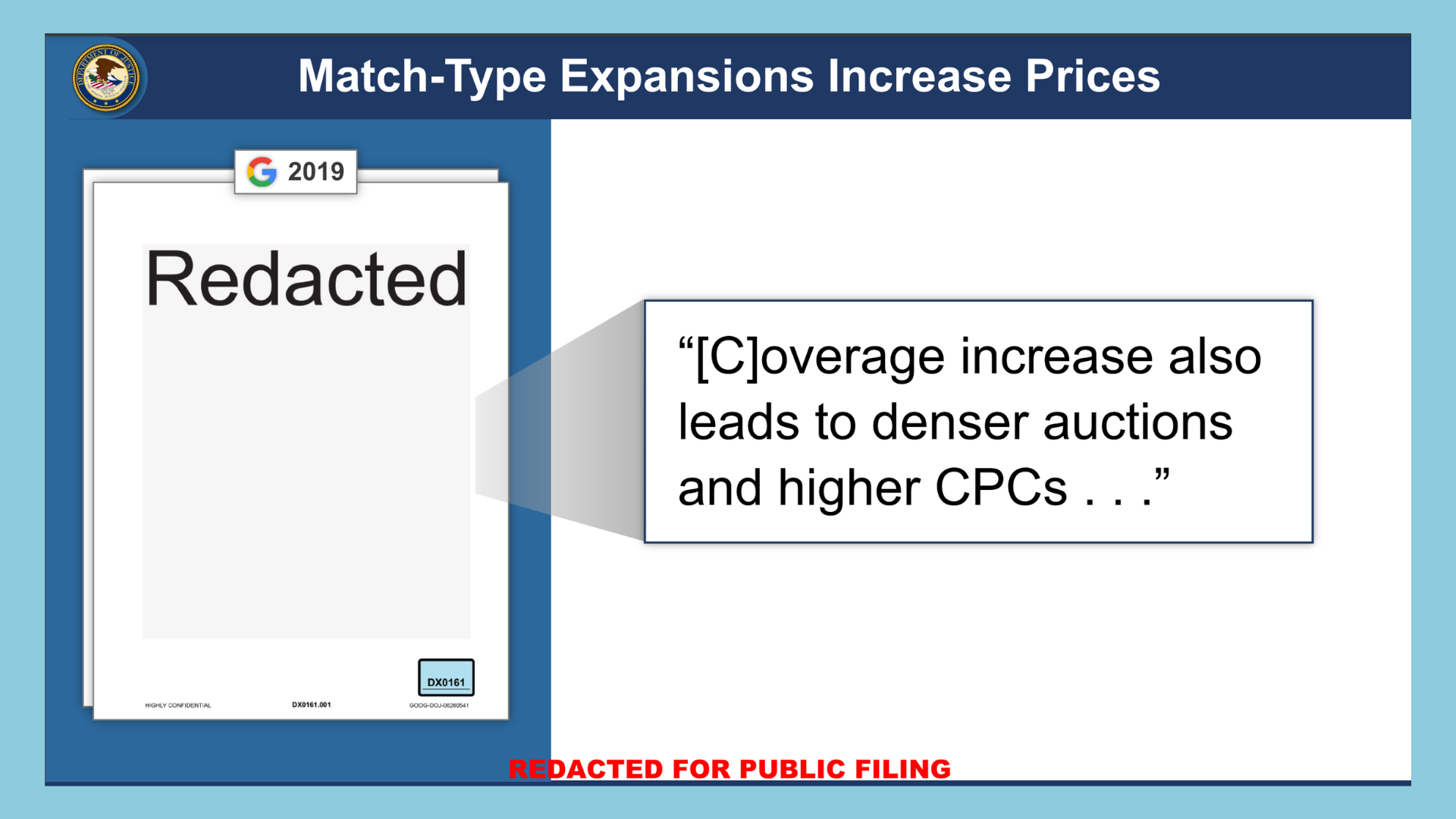
Google’s ad auction system is described as a “black box” due to the fact that nobody knows, with 100% certainty, how the system actually works.
Joshua Lowcock from $17.5 billion advertising giant IPG stated in court: “Advertisers have no true visibility into the way that the price is determined or how the auction is conducted”
With that said, Lowcock said he recommends “every client” advertise on Google and that even with an increase in prices, he will continue to recommend them doing so.
Here’s the catch 22 for us as PPC marketers: Google ads are still wildly effective.
Even with all of these shady actions and price increases from Google execs, the fact is companies are still generating leads and conversions at a price they deem viable for their business to grow.
But does that make what Google is doing right?
Reduction in Search Query Visibility
The case from the DOJ also touched upon the decrease in search query visibility for advertisers over time.
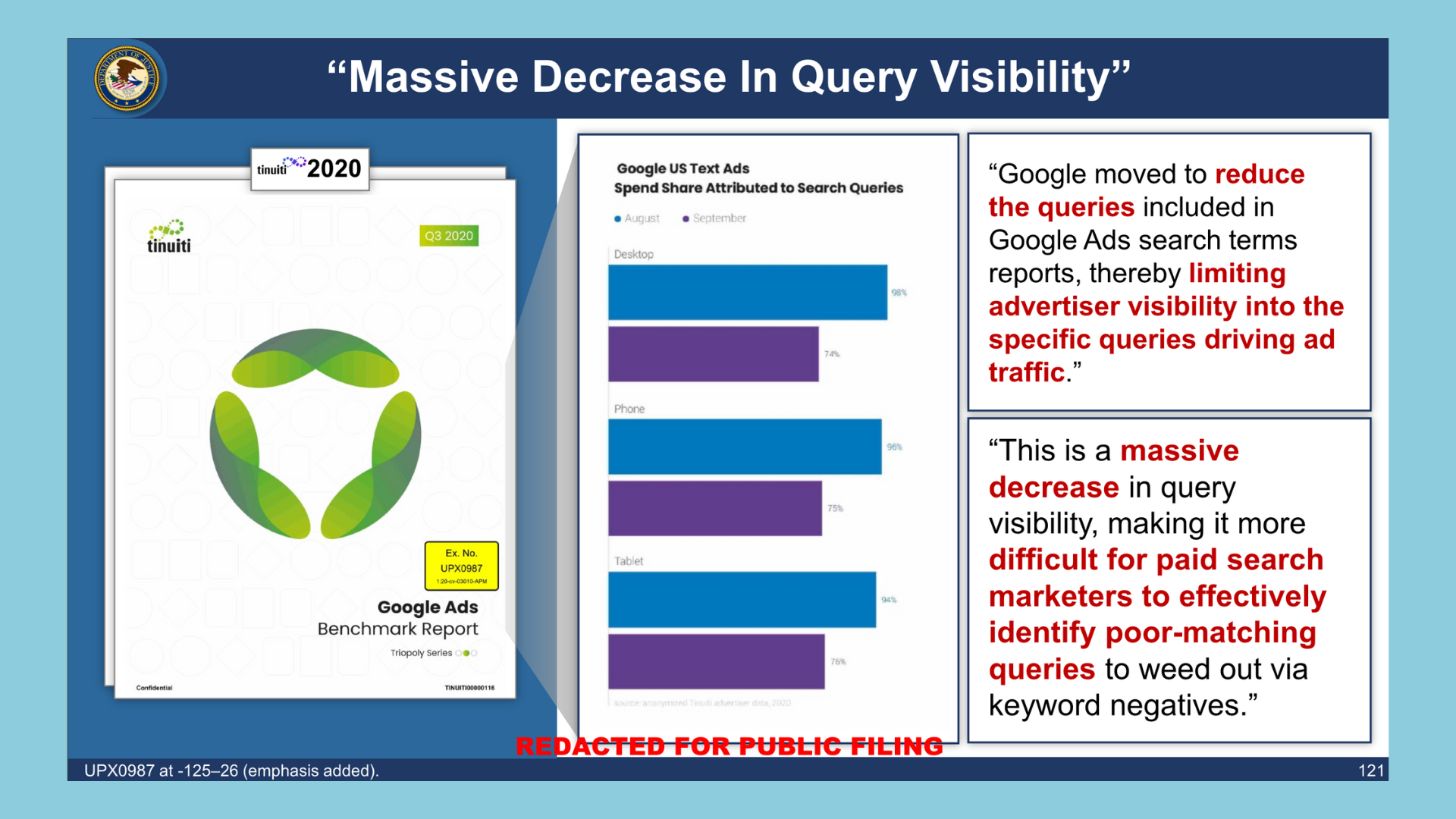
Professor Kinshuk Jerath suggests that this is downright wrong, and that advertisers should be entitled to know where their spend is going:
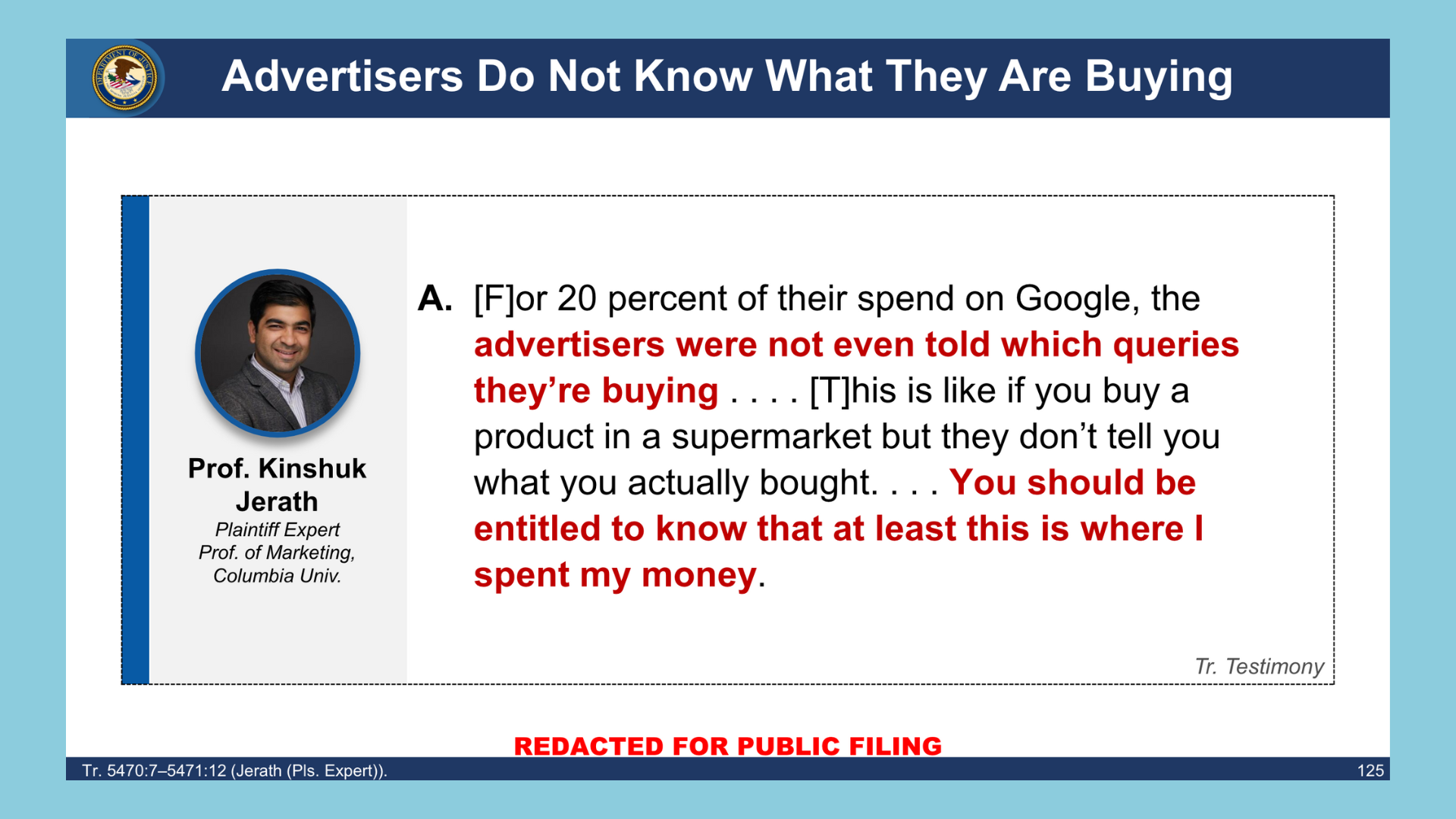
Response from Wider The PPC Community Think
Kirk Williams (PPC author) on his frustrations:
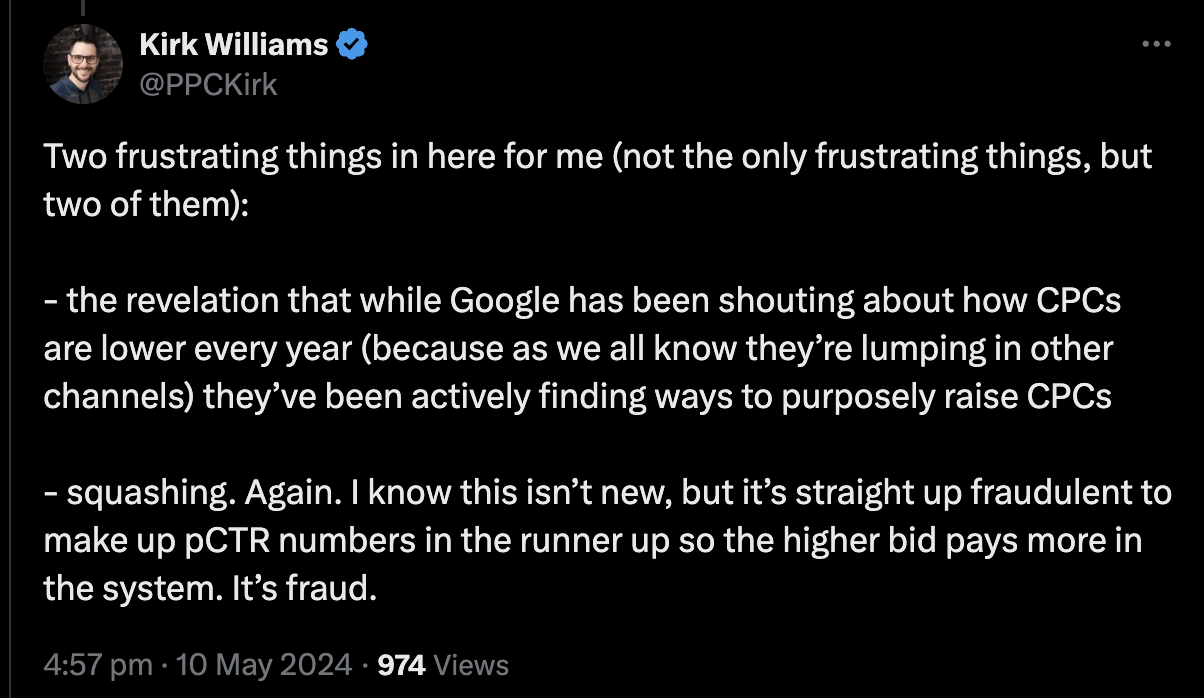
Google ads expert Stewart Dunlop on the secrecy:
- “Google seems to be so secretive about all of these behind-the-scenes tunings and tweakings, with project names that sound like something straight from a spy film. I think this lack of transparency and push towards an automated environment where advertisers just have to go with the flow is very damaging for trust.”
Sarah Stemen, paid ads expert, on lack of transparency:
- “It seems like Google is trying to hide the mechanics of a potential first-price auction rather than ensuring a truly fair second-price system.”
Boris Beceric, Google Ads consultant, shared his thoughts:
- “The only one ‘benefitting’ from randomization is Google.”
- “Google is a monopoly that’s raising prices without telling advertisers about it.”
Amy Hebdon, founder of Paid Search Magic, on RGSP:
- “With RGSP, Google has gaslit advertisers with disingenuous explanations of the changes, trying to convince us that this lack of transparency is for our benefit.”
Charley Brennand, founder of PPC academy, on her feelings of broken trust:
- “Now with the published data from the court case, we can see that we’ve been manipulated and actually, not even our Google counterparts are privy to what Google is up to.”
Jyll Gales, Google Ads Coach, on auction manipulation:
- “The people who should be most angered by this are Google’s top customers, the Amazons and Temus and Expedias of the world, who spend millions a year on Google Ads just to be punished for their investment by being ‘randomly’ pushed down.”
Dids Reeve, Paid Media Specialist:
- “It’s quite shocking to see in black and white the cynical way individuals at Google have discussed how they manipulate and warp the definitions and configuration of Google Ads metrics.”
Julie Friedman Bacchini (Founder of NeptuneMoon):
- “Advertisers and PPC pros have long suspected some of this stuff, but seeing it in these docs is still stunning.”
The Need for Scepticism and Testing
There’s a temptation to think that everything Google tells us is benevolent and accurate, but this trial has shown that we need to move forward with a healthy dose of scepticism.
As PPC marketers, one of the biggest levers we can pull is to test everything. Google may be telling you broad match campaigns will generate better results, but does a solid experiment prove that’s the case for your business specifically?
There is no doubt we’re moving more towards automation in PPC marketing (because it clearly does have some tremendous benefits) but I think this case supports the argument that we can’t just allow Google to run a ‘black box’ advertising product with very little insight into how it works.
Bringing Balance To The Conversation
This article has centered on Google as a big bad, malevolent monopoly.
But we’re not conspiracy theorists or anti-capitalists, we’re PPC marketers who understand the power of Google ads.
It’s important to show people the truth, but also to be fair and balanced in our assessment here.
Google clearly has some very secretive and possibly immoral practices when it comes to quietly manipulating their auction and ad prices.
But it’s also true that Google ads are still an incredibly profitable channel for many advertisers, otherwise those advertisers simply wouldn’t be present in the market.
In fact, even with all of Google’s shortcomings revealed from this trial, it remains the main paid marketing channel for marketers on the whole by some distance.
Additionally, Google employs some exceptionally talented people. Their search engine has undoubtedly brought about some significant benefits to society as a whole.
Search as an advertising channel is a magical invention in the sense that you can literally target customers depending on their exact searches.
This is a situation where we need to Government intervention to bring about a more fair and balanced environment for PPC advertisers.
With the department of justice bringing about these mammoth cases against Google, they presumably agree.
Google ads are still wildly profitable for many publishers, but if things continue as they are then surely in 10-15 years from now, this aggressive model of price increases and auction manipulation will simply become unsustainable.
If the Government doesn’t intervene now, it will be forced to later. We have to wait a few more weeks to see how the Judge in this case will rule.
Sources:
- All 143 slides from the DOJs closing statement: https://www.justice.gov/d9/2024-05/421661.pdf
- All DOJ fact finding (500+ pages) from the case – https://www.justice.gov/d9/2024-02/420260.pdf
- Expert quotes: https://searchengineland.com/advertisers-google-trust-collapse-440543
- RGSP explained: https://searchengineland.com/google-rgsp-randomized-generalized-second-price-ad-auctions-explained-433053
- The men who killed Google – https://www.wheresyoured.at/the-men-who-killed-google/




